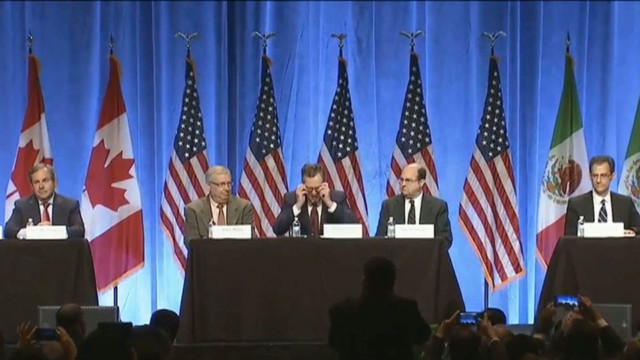The second round of talks on the North American Free Trade Agreement (NAFTA) has opened in Mexico City. Delegations from Canada, Mexico and the U.S. are discussing modifications to the agreement that would affect billions of dollars in trade and investment.
CGTN’s Franc Contreras reports.
President Donald Trump will not be in Mexico for the second round of NAFTA talks. On the eve of these talks, Trump tweeted NAFTA was a failure and repeated his threat to “terminate” the deal.
We are in the NAFTA (worst trade deal ever made) renegotiation process with Mexico & Canada.Both being very difficult,may have to terminate?
— Donald J. Trump (@realDonaldTrump) August 27, 2017
Publicly, Mexican officials have tried to dismiss Trump’s threats as part of his negotiating style. Privately, they’ve expressed concerns that it could stifle Mexico’s economy.
“It’s a renegotiation process we take very seriously,” Mexico’s Foreign Relations Secretary Luis Videgaray said. “It’s a constructive renegotiation, and we don’t think that it would be the correct or viable route to terminate the agreement.”
Mexico expects the Trump administration will try to change the NAFTA’s “rules of origin,” which govern what percentage of any product must come from North America.
The U.S. team wants a higher percentage of U.S. made auto parts in Mexican-assembled vehicles. Trump has threatened to impose steep tariffs on Mexican-built cars if that does not happen.
According to trade historian Enrique Cardenas, a decision by Trump to impose expensive tariffs on Mexico’s automobile sector could disrupt the global economy.
“The United States cannot elevate tariffs to 15 or 20 percent on the automobile sector, because that runs against rules by the by World Trade Organization,” Cardenas said. “The U.S. would have to leave the World Trade Organization triggering a global trade war of other dimensions.”
Another crucial dispute is on wages. The Trump administration wants to see a wage increase in Mexico, which would reduce the country’s low labor-cost advantage. Under NAFTA, low wages have attracted scores of global manufacturing companies to Mexico.
All sides hope to conclude the talks by January 2018.
 CGTN America
CGTN America

